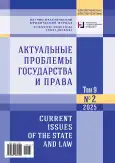Legal features of the activities of prosecutor’s office in the early crime prevention process
- Authors: Kashirina O.N.1
-
Affiliations:
- Lipetsk Region Prosecutor’s Office
- Issue: Vol 9, No 2 (2025)
- Pages: 281-290
- Section: Current Issues of Criminal Legal Sciences
- URL: https://journal-vniispk.ru/2587-9340/article/view/295369
- DOI: https://doi.org/10.20310/2587-9340-2025-9-2-281-290
- ID: 295369
Cite item
Full Text
Abstract
Until the end of the 80s of the 20th century, this direction of scientific research has received special attention, because in practice it proved its feasibility and effectiveness. In the 1990s, with the change of priorities in scientific research, the study of early crime prevention became less relevant, and the focus was on the organization of the fight against already existing crime. The adoption in 2016 of the Federal Law “On the Fundamentals of the System of Prevention of Offenses in the Russian Federation” did not solve all the problems. Law enforcers faced a number of problems related to the implementation of the provisions of said legislative act. It should be noted that at the time of the adoption of the Federal Law “On the Fundamentals of the System of Prevention of Offenses in the Russian Federation” the level of crime in the Russian Federation was quite high. A special place in the early prevention of crime is assigned to the prosecutor’s office of the Russian Federation. The purpose of this scientific article is to determine the peculiarities of the realization by the procuratorial bodies of their powers in terms of early prevention of crime. As a result of the study, conclusions are drawn about the importance of the activities of the prosecutor's office in the early prevention of crime.
About the authors
Olga N. Kashirina
Lipetsk Region Prosecutor’s Office
Author for correspondence.
Email: demchukolga@rambler.ru
ORCID iD: 0009-0001-8640-5425
Senior Justice Advisor
Russian Federation, 25 Zegelya St., Lipetsk, 398000, Russian FederationReferences
- Nasipov D.D. (2023). Procuratorial bodies and the function of crime prevention. Molodoi uchenyi = Young Scientist, no. 23 (470), pp. 359-361. (In Russ.) https://elibrary.ru/frsuzk
- Bozh’eva V.P. (ed.) (2008). Law Enforcement Agencies of Russia. Moscow, Higher Education Publ., 336 р. (In Russ.) https://elibrary.ru/qqodfp
- Vinokurov Yu.E., Vinokurov A.Yu. (2015). Procuratorial Supervision. Moscow, Yurait Publ., 472 p. (In Russ.) https://elibrary.ru/typbzf
- Bobrenev V.A. (2017). On the correlation of functions and directions of prosecutorial activity in the Russian Federation. Politseiskaya i sledstvennaya deyatel’nost’= Police and Investigative Activity, no. 4, pp. 1-8. (In Russ.) https://doi.org/10.25136/2409-7810.2017.4.24381, https://elibrary.ru/ymyqlv
- Vinokurov A.Yu. (2016). On the issue of participation of prosecutor’s offices in the prevention of offenses in the Russian Federation. Administrativnoe i munitsipal’noe pravo = Administrative and Municipal Law, no. 7, pp. 620-626. (In Russ.) https://doi.org/10.7256/1999-2807.2016.7.19590, https://elibrary.ru/wkbukl
- Stupachenko E.V. (2019). Interaction of Prosecutor’s Offices with Permanent Coordination Meetings to Ensure Law and Order in the Subjects of the Russian Federation. Cand. Sci. (Law) diss. Moscow, 245 p. (In Russ.) https://elibrary.ru/jiagex
- Petrov A.I. (2018). Activity of prosecutor’s office on legal education as a means for preventing offenses against the laws and crimes. OECONOMIA ET JUS, no. 3, pp. 48-62. (In Russ.) https://elibrary.ru/ybcbjb
- Kuz’menko E.Yu., Mentyukova M.A. (2024). On the issue of peculiarities of juveniles criminal liability and the structure of crime (regional aspect). Aktual’nye problemy gosudarstva i prava = Current Issues of the State and Law, vol. 8, no. 4 (32), pp. 576-586. (In Russ.) https://doi.org/10.20310/2587-9340-2024-8-4-576-586, https://elibrary.ru/ybeiao
- Ergashev E.R., Gabysheva E.A. (2018). Legal means of the prosecutor: problems of understanding, application, and legal regulation. Rossiiskoe pravo: obrazovanie, praktika, nauka = Russian Law: Education, Practice, Research, no. 5, pp. 38-44. (In Russ.) https://elibrary.ru/mkjekt
- Artamonov A.N. (2016). Prosecutor’s powers in supervising application of laws by interrogation and preliminary examination agencies. Zakonodatel’stvo i praktika = Legislation and Practice, no. 1, pp. 73-80. (In Russ.) https://elibrary.ru/whamfd
Supplementary files

Note
Author’s contribution
O.N. Kashirina – concept development, normative documents collection and processing, scientific literature analysis, writing – original draft preparation, preparation of the manuscript in accordance with the requirements of the Editorial Board.







